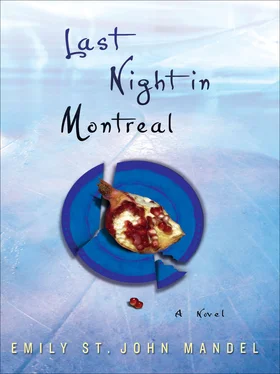“Hold still, now,” he said gently, although she hadn’t been moving. She didn’t answer, but she did wrinkle her nose at the smell of bleach. It hurt much more than she had thought it would. She winced and tried to ignore the smell and the tingling while he stood close beside her and kept up a soothing, uninterrupted monologue: “Did I ever tell you, my dove, about the time I was working as a magician in Vegas? This was at a place called La Carnivale, one of the big old casinos, and. .” And she didn’t say anything, but he didn’t expect her to. She never could remember why they’d left in the first place, but she did remember that in the first year of traveling she didn’t say very much. She was unmoored and her memories were eroding in the sunlight, and she was rendered shy by the strangeness of this fast new life. He was driving south.
He would talk to her whether she’d talk to him or not, and it was his voice that gradually put her at ease. He could talk about types of stone, about Goya’s black paintings or the magnificent staircase in Rembrandt’s Philosopher in Meditation, about genetics: the specific signatures of persistent genes, replicating themselves endlessly through the diluting generations. When she grew quiet and despondent, which was often in the beginning, he liked to save her with a fact. Did you know that my favorite composer went deaf at the height of his career? Did I ever tell you about the moons of Jupiter? There’s this one in particular that’s covered in ice. . She didn’t know him well in the very beginning, but she was profoundly soothed by the sound of his voice. On this particular night, twenty hours after he’d lifted her from the snow, he was talking about the arcing bridge in Monet’s garden, the way it changed, over the passage of the painter’s career, from sharpness into an almost abstract vagueness. “Think of that,” he was saying. “An object changing in the manner of a memory.” He rubbed her burning head with a towel. “Et voilà!” he said. “Brace yourself, my dove, this will be startling. .” and he held Lilia up to the motel bathroom mirror.
The effect was shocking. She remembered that moment as the first time she ever looked in a mirror and didn’t recognize herself. A strange child with short disheveled blond hair stared back at her, and she felt suddenly, inexplicably safe. Not only safe but elated; the first time true happiness ever coursed through her chest, like the breaking open of a gate.
“You like it?”
She smiled.
“I’m glad you approve. Now you just need a new name,” he said.
The first false name was Gabriel, chosen because with short hair she looked very much like a boy, and he figured a little ambiguity couldn’t hurt. Still, the name didn’t seem fraudulent; she couldn’t help but feel that Gabriel was just as real as Lilia, and as real as the dense parade of phantoms that followed: after Gabriel she was Anna, and she was Michelle, Laura, Melissa, and Ruth by spring. In retrospect her childhood was all false names and lost memories; the more time passed, the harder it was to say what was real and what wasn’t. There were scars on her arms for which she had no explanation.
“What was the book about?” Eli asked sleepily. “What were the delirious things?”
They were lying together under the pomegranate-stained sheets, the blue plate broken somewhere at the foot of the bed, and he’d been apologizing again for throwing her book out the window. Now that it was gone, he was curious about it.
“They were memories.” Her voice was languid. “The way they go all hazy when you stare at them too long.” After some time had passed he pressed for more details, but she’d fallen asleep. Breathing lightly against his arm.
It was never very easy to reach her, like loving someone who was rarely in the same room. But it would have been difficult to imagine, in a purely abstract sense, a girl more perfect; he’d had to concede shortly after she’d moved in with him that she was no less interested in his field of study than he was. He lived quietly alongside his work, he couldn’t imagine being separated from it, he wanted to know as much about it as possible, he thought about it now and then through the course of any given hour in the day. But she was caught up in it, she was dancing with it, she was having a fling. She understood the poetry of multiplicity, of estrangement, of irreconcilable concepts of geography: in one of the Mayan languages there are nine different words for the color blue. (He’d been aware of this for years, but she was the one who made him wonder what all those untranslatable shades of blue might look like.) In Wintu, a language of ancient California, there are no words for right and left: speakers differentiate between riverside and mountainside, from a time when it was taken as a given that you would live your life and bear children and die in the landscape where you and your parents and your great-great-grandparents had been born. A language that would disintegrate at sea, or while traveling beyond either the river or mountains; go beyond the boundaries and there would be no reference points, no words to describe the landscape you moved through — imagine the unfathomable cost of leaving home. Or the Australian Guugu Yimithir, a language of ferociously absolute positioning, in which there was no way to tell someone, for instance, that Lilia is standing to your left; you’d have to say, instead, “Lilia is standing to the west of me.” In that language there are no variables, only north, south, east, west. If that were the only language you had ever known, would it be possible to think in relative terms, in terms of variables, directionlessness, things that are changeable and a little delirious rather than certain, mirages, shades of grey? She read deep into his books and surfaced with questions, and he read to her sometimes aloud from his notes: “I dream in Chamicuro,” the last fluent speaker of her language told a reporter from the New York Times, in her thatched-hut village in the Peruvian jungle in the final year of the twentieth century, “but I cannot tell my dreams to anyone. Some things cannot be said in Spanish. It’s lonely being the last one.”
He looked up from his notebook and there were tears in her eyes. If the dreams of the last speaker of Chamicuro won’t survive the passage into another language, then what else has been lost? What else that was expressible in that language cannot be said in another? A language disappears, on average, every ten days. Last speakers die, words slip into memory, linguists struggle to preserve the remains. What every language comes down to, at the end, is one last speaker. One speaker of a language once shared by thousands or millions, marooned in a sea of Spanish or Mandarin or English. Perhaps loved by many but still profoundly alone; reluctantly fluent in the language of her grandchildren but unable to tell anyone her dreams. How much loss can be carried in a single human frame? Their last words hold entire civilizations.
In the language of the Hopi tribe, there is no differentiation between past, present, and future tense. The divisions do not exist. “What does that do to time?” he asked one night, half drunk on red wine. They had long since closed their books for the evening. He was running his fingertips over her collarbone, tracing that little hollow just below her throat with his thumb. It was already October. She would be gone in a week.
“No,” she said softly, “what does it do to free will?”
He was preoccupied with kissing her neck and didn’t immediately understand what she meant. But he couldn’t fall asleep that night, and when the understanding finally hardened and crystallized, hours later, it was enough to jolt him out of bed. He sat for a long time in the darkened living room, wide awake, listening to her breathing in the adjoining room.
Читать дальше












